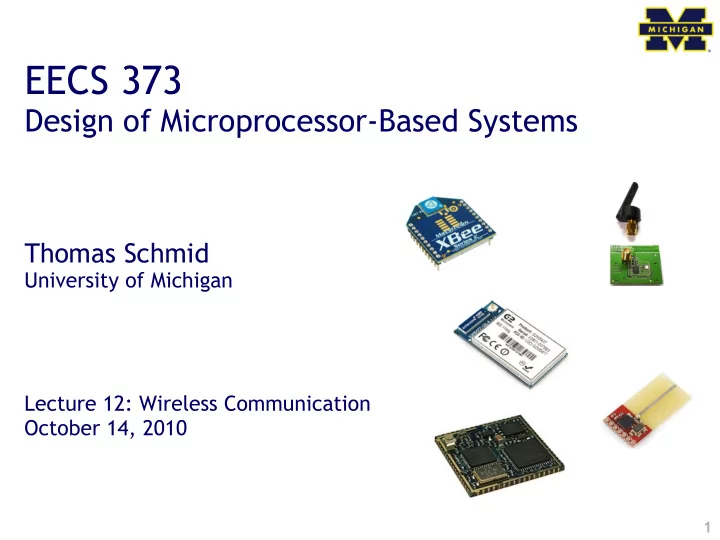

EECS 373 Design of Microprocessor-Based Systems Thomas Schmid University of Michigan Lecture 12: Wireless Communication October 14, 2010 1
Minute Quiz... 2
Announcements • How do we deal with virtual timers that are close together? – Keep time running while executing current handler – When handler returns, check for time and the next virtual timer – If it is time, execute the next handler. Else, set the HW timer 4
Inter-Integrated Circuit - I 2 C • What is the simplest way to connect many serial devices with just 2 wires? • Addressing of chips • Message acknowledgment • Single master - multiple slave • Multiple master - multiple slave • Two bi-directional open-drain lines SDA, SCL – Pull-up resistors to Vcc • 7-bit address space with 16 addresses reserved 5
I2C Stop CLOCK PULSE FOR Condition ACKNOWLEDGMENT START CONDITION SCL 1 2 8 9 NOT ACKNOWLEDGE SDA ACKNOWLEDGE ACK A2 A1 A0 R/W A6 A5 A4 A3 A2 A2 A2 SDA 0 1 0 A2 1 A2 A1 A0 NOP/W ACK MSB LSB START SCL S 0 A A A P R/W 6
How can we cut the cord? 7
Modulation is Key to Wireless Communication • Transmit information over an analog pass-band channel • AM/FM Modulation • Alphabet of M=2 N alternative symbols, each of size N • If we have f s S/s, the data rate is N·f s bits/s • Fundamental Digital Modulation • Phase-Shift Keying (PSK) • Frequency-Shift Keying (FSK) • Amplitude-Shift Keying (ASK) • Quadrature Amplitude Modulation (QAM) 8
Phase Shift Keying BPSK Constellation • Binary PSK (BPSK) M=2 • Quadrature PSK (QPSK) M=4 • 8PSK (M=8), 16PSK (M=16) • Differential PSK (DPSK) Differential QPSK (DQPSK) • Offset QPSK (OQPSK) O-QPSK Constellation 9 Figures from wikipedia.org
Quadrature Amplitude Modulation • Adds amplitude modulation to phase shift keying 16-QAM Constelation 10
Recommend
More recommend